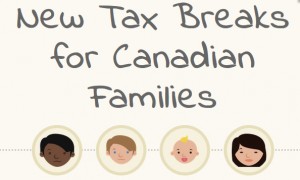 Last week, on October 30th 2014, the federal government announced a new so-called tax break.
Last week, on October 30th 2014, the federal government announced a new so-called tax break.
The unveiled plan lets Harper use his “promise made, promise kept” mantra. However, is the plan itself good policy or good politics? What’s in it for YOU, the taxpayers?
Here are the 3 main points of the announcement:
- Income Splitting: Couples with children under 18 can share up to $50,000 of income, up to the maximum of $2,000 in non-refundable federal tax credit, effective for 2014 tax year.
- Universal Child Care Benefit (UCCB): Families with children under 18 will gain an extra $60 per month per child, effective for 2015 tax year.
- Child Care Expense Deduction: Families with children under 18 or infirmed children over 16 will have an extra deduction room of $1,000 per year per child in child care expense, effective for 2015 tax year.
Thoughts:
- Non-refundable tax credits are not equal to the actual cash value, so do not think of this as having an extra $2,000 in your pocket.
- For families with very low taxable incomes, no credit is available to transfer. This also does not work for families with two similar taxable incomes.
- The UCCB benefit is fully taxable. The existing child tax credit will be eliminated. Hence this $60 extra is looking more like $23 after taxes. Well, it is still better than nothing, I guess.
- Make sure to check with a tax professional to see how to claim (and indeed if you can claim) the benefit in the case where couples are separated or divorced and share custody of their children. You may even have to visit a family lawyer again to work this out with your child’s other parent.
Final notes:
This plan is not as great as it appears to be and is not for everybody. The main beneficiaries will be middle class families with young children and uneven taxable incomes, which only account for a small segment of Canadians.
Personally, I would like to see a real broader tax cut that would benefit all taxpayers. I also would like to see plans to encourage entrepreneurship, cut government spending, balance the budget, and reduce debt, just to name a few.
For families who will benefit from this new tax cut, make sure you spend your new-found money wisely. May I suggest contributing towards your children’s education savings fund.
For those who got left out, make sure you claim all of your eligible tax credits when filling your income tax returns. You might want to consider various tax strategies that can be used to reduce your tax payable such as contributing to an RRSP, keeping fully-taxable investments inside a TFSA, or splitting pension benefits. Is your situation different from last tax year? If so, take a look at the tax guide to see if there is anything that might apply to you. When unsure, ask a professional to review it.
This note is written as a general source of information only. Should you have any questions, or wish to discuss your specific circumstances, please feel free to contact us directly at info@RetireRightCanada.ca.
